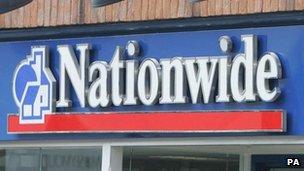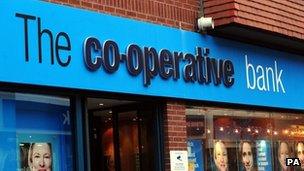Nationwide's shares lifeline
- Published
- comments

The Bank of England is keen for Nationwide to be a pioneer in a new type of financial instrument
A week ago Nationwide Building Society seemed to get a massive reprieve from its regulator, the Prudential Regulation Authority, when it was told that it had till the end of 2015 to meet a new "leverage" target of 3%.
Without going over all the technical niceties yet again, the ordinance that big banks and building societies had to meet this target meant, for Nationwide, that it has to find about £2bn of additional capital, as a buffer to absorb potential losses (it is a way of making banks and building societies stronger).
The PRA's original idea, that big deposit-takers should raise all this precious capital by the end of this year, represented a bit of a problem for Nationwide (and for Barclays - which is a story for another day).
On the one hand, Nationwide's profits after tax were just £210m last year. So on that level of profitability, it would take more than nine years for Nationwide to generate the needed £2bn - and that was on the assumption that it engaged in no additional net lending, since the leverage ratio stipulates it has to raise £30 of incremental capital for every £1000 loan it makes.
And, to tell you what you already know, Nationwide could not raise the capital by selling shares, as a bank can do, because Nationwide is a mutual.
Profit levels
But hang on a second, you may be saying, 2015 is only a couple of years away.
It is obviously kind of the regulator to give Nationwide years not months to raise the needed capital, but how on earth can Nationwide raise £2bn by 2015, if its profits are only £200m or so per annum?
I put this question to Nationwide's finance director, Mark Rennison.
He points out that before the great UK stagnation that followed the 2007-08 financial crisis, Nationwide's profits reached a peak of £800m.
Now he was neurotic not to be seen to be making a profit forecast.
But he pointed out that bad debts, especially in commercial real estate are falling, that the group has improved its mix of assets so that its interest rate margin (the gap between its cost of borrowing and cost of lending) is improving, and a big loss it made last year on the valuation of its hedges and derivative contracts should not be repeated (please don't ask for more detail on this latter point, or we'll be here all day - if you're desperate, scroll back through more than five years of my BBC blogs and you'll find what you need).
So what level of profit could and should Nationwide be generating over the next couple of years?
Well it has total assets (loans and investments) of £191bn.
For a clean, simple bank like Nationwide it should be possible to generate a 0.5% return on gross assets - and that would imply profits of about £1bn.
As I say, Mr Rennison wouldn't commit Nationwide to generating any specific level of profit, for fear of breaching the rules of the Financial Conduct Authority (the other regulator).
But it has to be the case that Nationwide is budgeting to make £1bn of profit per annum, given that the regulator does not want Nationwide to contract the amount of credit it provides to the British economy (one way for any bank to meet a leverage ratio - which many would see as economically harmful - is to shrink the volume of loans and investments on its balance sheet).
Pioneer
So let's take it for granted that the Prudential Regulation Authority regards it as highly plausible that Nationwide is a financial institution that could and should be generating a billion pounds of annual profits.
How certain is it that Nationwide will generate that profit over the coming two years, so that it can meet its leverage target?
Well not that certain. Although the housing market seems to be enjoying a recovery right now, which is plainly good for a market-leading mortgage provider like Nationwide, all sorts of bad economic things could happen abroad and here in the coming months.
So no sensible regulator would want any bank to have only a single intrinsically uncertain strategy for raising important capital.
Which is why the Bank of England and its Prudential Regulation Authority is desperately keen for Nationwide to be a pioneer in selling to investors new bits of funny paper that look and quack quite a lot like conventional shares issued by banks (and any public company).
So let's give a big hello to a rather bizarre looking, newly engineered beast of the financial world, Core Capital Deferred Shares.
Now I know you will be sorely tempted to stop reading now, and look for some fresh paint to watch drying.
But although you may feel you don't need to know anything about raising money by flogging something with such a stultifying tedious name, these Core Capital Deferred Shares could be the salvation of the entire building society and mutual bank sector.
Because if they work - and that's by no means certain - they will for the first time address one of the great flaws for mutuals, which is that they cannot easily increase their life-saving capital except through making profits.
To put it another way, there is no way for building societies to raise additional properly loss-absorbing capital in a hurry.
So if a mutual gets into difficulties through its own stupidity, or if regulators feel all banks and building societies need to boost their capital because some great economic horror is coming down the track, mutuals are a bit stuck.
They can merge with bigger stronger mutuals in those difficult circumstances (though Nationwide is the biggest of them all, so that's not an option for it).
They can demutualise and become a conventional bank, as Northern Rock and Abbey National, inter alia, did - with rather mixed results.
They can convert into banks and ask their other creditors to take a loss (as mutually owned Co-op Bank is doing).
Or they can acknowledge that they're bust, and be taken over by the Bank of England, and be broken up and wound down (as happened to the Dunfermline Building Society in 2009).
So the point of these Core Capital Deferred Shares is that in theory they offer a less painful and arduous way for mutuals to fill a capital hole.
Without wishing to exaggerate, they may make it possible for all mutuals to plan on the basis that they can remain mutuals more-or-less forever.
If they work.
Dividend cap
So what are they?
Well they would - in effect - be part of a building society's common equity, on an equal basis with its reserves.
So in the extreme case where a building society goes bust, their value would be reduced in proportion to the reduction in the rest of the building society's reserves.

The problems at the Co-op Bank have highlighted the risks of investing in a mutual organisation
In other words, they are not like other fancy bonds previously issued by building societies and the Co-op Bank, in that there would be no argument that their intrinsic value would fall when the issuing society makes losses.
And they pay a dividend, similar to the dividend paid by a bank on its shares. Or to put it another way, the dividend is below the tax line, or not offsettable against tax (unlike the interest payment on bonds issued by banks and building societies).
But - and this is important - they don't carry quite the same ownership rights as a share in bank does.
What do I mean by that?
Well let's say you buy £100m of Nationwide's £1 Core Capital Deferred Shares. Unlike a bank, that would not give you 100 million votes at the annual meeting.
All that £100m would do is make you a member of the Nationwide and you would have one vote, just like millions of Nationwide savers.
You would have no more influence over the management of Nationwide than a saver with £100 in their account.
Also, although you would receive dividends, Nationwide has decided there will be a maximum amount in dividends you could ever receive - equal to 15% of the issuing price of the Core Capital Deferred Shares.
That means you would not benefit to an unlimited extent from the success of Nationwide, unlike the position when you buy a share in bank (please don't laugh - I know banks have not been unmitigated successes of late).
Compensation
Why this restriction on dividends?
Well Mark Rennison says it's because Nationwide doesn't want there to be any suspicion that Nationwide would be losing its mutual ethos, and taking excessive risks to generate ever bigger dividends.
And, for a similar reason, in a wind-up of Nationwide (heaven forfend) holders of these funny share-like things could never get back more than the issuing price - to put them on an equal footing with ordinary members of the society.
So in many ways Core Capital Deferred Shares are inferior to ordinary bank shares: they carry fewer voting rights, and there are limits on how valuable they can become.
Which means, of course, that investors in them would want some kind of compensation, or offsetting factors, for that inferiority.
Or to be clearer, investors will demand a bigger initial dividend, as recompense for the longer term limits on returns.
Which means that they will be quite an expensive way for Nationwide to raise money.
How expensive. Well all Mr Rennison would say is that he would expect the initial dividend yield - in effect the interest rate paid by Nationwide - to be less than 10%.
Which is pricey, given that there is no tax allowance for the building society.
And, right now, if Nationwide were to issue these things, they would be even pricier - because investors looking at the mess at the Co-op Bank can't ignore the potential risks of investing in a mutual organisation (although they all know that Nationwide has been much better managed than Co-op Bank used to be).
Mr Rennison says that the bank would like to sell about £500m of these new share-like things initially, and then see if a market develops and the cost of issuing them comes down.
With a following wind, it could sell that £500m towards the end of the year or early next year - though that's by no means certain.
The building society sector, and its supporters, and regulators will all be hoping this is more than some boffin's clever theoretical wheeze, and that these become a reality of the stock market.
Because at a time when the Co-op's woes have cast a cloud over the sector, they represent a lifeline for mutuality.